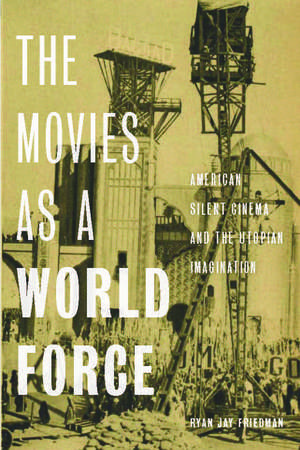The Movies as a World Force: American Silent Cinema and the Utopian Imagination
Autor Professor Ryan Jay Friedmanen Limba Engleză Hardback – 3 feb 2019
Throughout the silent-feature era, American artists and intellectuals routinely described cinema as a force of global communion, a universal language promoting mutual understanding and harmonious coexistence amongst disparate groups of people. In the early 1920s, film-industry leaders began to espouse this utopian view, in order to claim for motion pictures an essentially uplifting social function. The Movies as a World Force examines the body of writing in which this understanding of cinema emerged and explores how it shaped particular silent films and their marketing campaigns. The utopian and universalist view of cinema, the book shows, represents a synthesis of New Age spirituality and the new liberalism. It provided a framework for the first official, written histories of American cinema and persisted as an advertising trope, even after the transition to sound made movies reliant on specific national languages.
Preț: 910.98 lei
Preț vechi: 1011.97 lei
-10% Nou
Puncte Express: 1366
Preț estimativ în valută:
174.32€ • 186.40$ • 145.34£
174.32€ • 186.40$ • 145.34£
Carte indisponibilă temporar
Doresc să fiu notificat când acest titlu va fi disponibil:
Se trimite...
Preluare comenzi: 021 569.72.76
Specificații
ISBN-13: 9780813593609
ISBN-10: 0813593603
Pagini: 264
Ilustrații: 20 B&W
Dimensiuni: 152 x 229 x 23 mm
Greutate: 0.45 kg
Ediția:None
Editura: Rutgers University Press
Colecția Rutgers University Press
ISBN-10: 0813593603
Pagini: 264
Ilustrații: 20 B&W
Dimensiuni: 152 x 229 x 23 mm
Greutate: 0.45 kg
Ediția:None
Editura: Rutgers University Press
Colecția Rutgers University Press
Notă biografică
RYAN J. FRIEDMAN is an associate professor of English and the director of film studies at Ohio State University in Columbus. He is the author of Hollywood’s African American Films: The Transition to Sound (Rutgers University Press).
Cuprins
Acknowledgments
Introduction: Motion Pictures and Modern Communion
1 Enlightened Public Opinion: Post-Reform Progressivism, Mental Science, and Gerald Stanley Lee’s “Moving-Pictures”
2 “The Occult Elements of Motion and Light”: Vachel Lindsay’s Utopia of the Mirror Screen
3 “The Motion Picture Is War’s Greatest Antidote”: Rescue as Release of Force in D. W. Griffith’s Intolerance
4 “Everything Wooed Everything”: The Triumph of Morale Over Moralism in Rupert Hughes’s Souls for Sale
5 “Little Grains of Sand”: Positive Thinking and Corporate Form in Douglas Fairbanks’s The Thief of Bagdad
Conclusion: Universal History and the Historicity of Film Entertainment
Notes
Index
Introduction: Motion Pictures and Modern Communion
1 Enlightened Public Opinion: Post-Reform Progressivism, Mental Science, and Gerald Stanley Lee’s “Moving-Pictures”
2 “The Occult Elements of Motion and Light”: Vachel Lindsay’s Utopia of the Mirror Screen
3 “The Motion Picture Is War’s Greatest Antidote”: Rescue as Release of Force in D. W. Griffith’s Intolerance
4 “Everything Wooed Everything”: The Triumph of Morale Over Moralism in Rupert Hughes’s Souls for Sale
5 “Little Grains of Sand”: Positive Thinking and Corporate Form in Douglas Fairbanks’s The Thief of Bagdad
Conclusion: Universal History and the Historicity of Film Entertainment
Notes
Index
Recenzii
"The Movies as a World Force is a significant contribution to the historical study of the American cinema of the silent era, charting an expansive but largely unacknowledged utopian discourse about history, social progress, and the massification of culture that was central to the screen practices of early Hollywood and to various middlebrow projects of linking commercialized culture to the progress of democracy. Friedman does an outstanding job of making visible the contours of this expansive and decidedly anti-modern historical tendency, describing how the cinema was its inspiration and a principal site for its articulation. This book challenges us to rethink our understanding of the emergent studio system and the function of public relations in relation to what were undoubtedly widespread beliefs in the cinema as a spiritual force of global transformation."
"Recommended."
Descriere
The Movies as a World Force is the first analysis of utopian cinema writing; situating it in its proper intellectual contexts, theology, and political philosophy; and illustrating the ways in which its utopian imagination shapes and is shaped by the era’s most prestigious film genre, the historical crowd epic.
